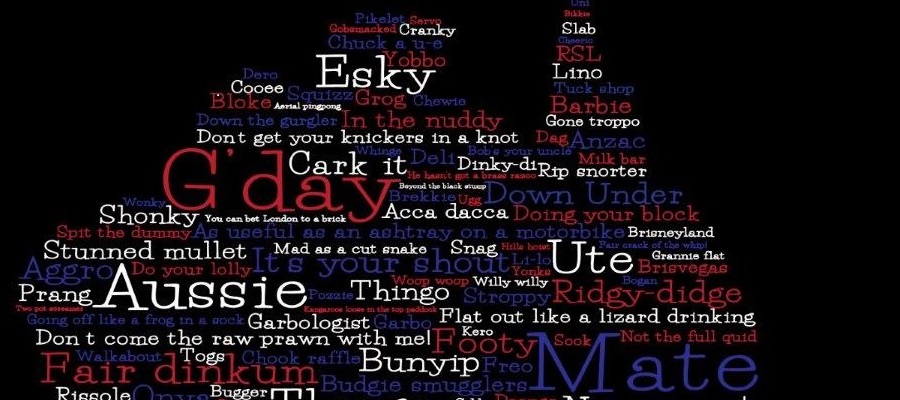Australia, the Land Down Under, is a country like no other in the world. And with the inimitable1 landscape comes a unique way of speaking English. Having spent a couple of years in the USA before I moved to Australia, I had a fantastic opportunity to compare the two versions of English.
In saying this I don’t mean that Americans and Australians simply have different words. Americans eat bell peppers2, get medicines at their pharmacy and throw their trash in their trash cans. Australians eat capsicums2, go to their chemist for medications and toss their rubbish in a bin. All these examples are considered to be standard language. I will talk about real slang – words and expressions that are sub-standard and that you don’t find in a regular dictionary. Australian slang is very humorous, witty and colourful. It is an excellent example of how experience shapes language and how language shapes national identity.
Most articles about the Australian slang list terms like fair dinkum3 to express something is true or genuine or sheila for a girl or a woman. While these terms are Aussie slang par excellence, their usage in everyday language is more and more limited, and to be perfectly honest, I have only heard them used very occasionally. Aussies will more typically have cuppas (cups of tea or coffee) and take smokos (a cigarette or coffee break). They drink schooners (a large beer glass) or stubbies (beer bottles) that they keep in eskies (ice coolers). Their tradies (electricians or mechanics) often drive utes (pickup trucks). They like eating heaps (a lot) and often they cook sangas (sausages) on a Barbie (barbeque). They will greet you with a g’day mate (hello buddy) and tell you good onya (well done) when you have done something right. When they are flat out (very busy), they have no time to muck around (play around, act inappropriately). Their mail is brought to them by their postie (post/mail man) who rocks up (arrives) every day on his bike. Aussies sometimes like to chuck a sickie (call in sick even if they are not crook – sick, feeling unwell) and they are stoked (very pleased) when they like something. When you visit a bottlo (liquor store, bottle shop), you can often meet a bogan (person from a working class background who is not very sophisticated and refined).
It is very typical and almost unbelievably common in Aussie slang to shorten words and alter word endings. Australians sometimes get aggro (aggressive); they love watching footy (football) and having barbies in the arvo (afternoon). They eat bickies (biscuits) as part of their brekkie (breakfast); they wear cardies (cardigans) and sunnies (sunglasses) and smoke ciggies (cigarettes). They don’t like mossies (mosquitoes) but love their beer that they buy at bottlos. They renew their regos (car registration) and bring their cars to servos (service/ gas station). They watch docos (documentaries) and they buy scratchies (scratch lottery tickets). They bring their children to kindy (kindergarten), and for birthdays they give each other prezzies (presents).
Slang words and expressions reflect essential aspects of the Aussie character and identity. In my opinion nothing illustrates this better than the phrase “no worries mate, she’ll be right”. It perfectly mirrors a national stoicism that suggests there is no point in worrying about anything because everything (“she”) will be alright in the end.
While other English speakers might use slang on purpose to be more casual and maybe less pretentious4, for Aussies the use of slang has become so widespread that you truly can’t imagine the language without it. Like no other country that I know, the use of slang really strengthens the Aussie national identity and contributes to make this country unique.
ACTIVITY: CHOOSE THE RIGHT ANSWER!
1. For his birthday Jack received heaps of …….. .
a) sangas, b) prezzies, c) tradies
2. The local pub sells a lot of …….. .
a) bickies, b) scratchies, c) schooners
3. We met our friends in the park last Sunday …….. .
a) aggro, b) arvo, c) rego
4. Tonight we will watch some ……… on television.
a) docos, b) eskies, c) mossies
5. The day was very bright so I had to wear my …….. .
a) cardies, b) sunnies, c) tradies
Veronika Penberty-Groves
Vocabulary: 1 jedinečný, nenapodobiteľný – jedinečný, nenapodobitelný; 2 sladká paprika; 3 (dinkum) rýdzi, pravý – ryzí, pravý; 4 [pritenš∂s] honosný, snobský
Key: 1. b; 2. c; 3. b; 4. a; 5. b

